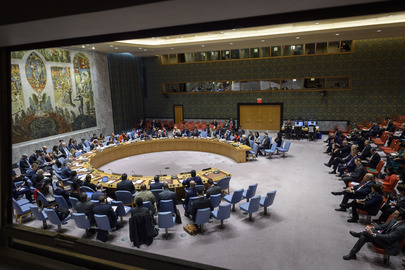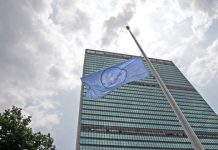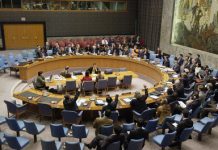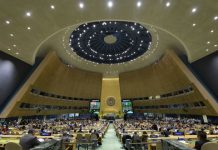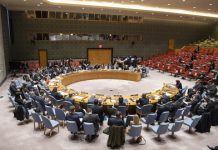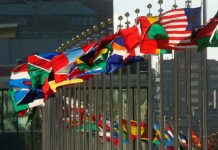Filippo Grandi said the number currently stands at 114 million. “Next month we will update this figure. It will be higher,” he added.
Mr. Grandi recalled his last briefing to ambassadors seven months ago, when he shared his views on several crises around the globe.
Non-compliance with international law
He said the situation has not changed and has even grown worse because warring parties do not comply with international humanitarian law.
“Parties to conflicts — increasingly, everywhere, almost all of them — have stopped respecting the basic rules of war and sometimes even pretending to do so,” he said.
“Civilians are killed in growing numbers, rape and other forms of sexual violence are used as weapons of war, civilian infrastructure gets hit and destroyed, humanitarian workers become targets.”
Gaza conflict
Mr. Grandi noted that because of these violations, civilians have no other choice but to flee in terror.
“What has happened in Gaza since the Hamas attacks last 7 October and throughout the Israeli offensive is a case in point,” he continued.
The UN refugee chief added his voice to those who have been urging the Council to pursue an immediate ceasefire, the release of hostages, the full resumption of humanitarian aid and a return to a real peace process.
Against ‘forced exodus’
While upholding the universal right to seek asylum, he said that “in this case, there is also — and especially — the international legal obligation of an occupying power not to force the civilian population to flee the territory it occupies.”
He warned against “another forced exodus of Palestinians”, saying this “will only create one more intractable problem and make a solution to this decades-long conflict impossible to find”.
Unresolved crises worldwide
Mr. Grandi told the Council that the war in Gaza must also serve as a call not to forget other unresolved crises, such as the conflict in Syria.
Some 5.6 million Syrians are now living as refugees in neighbouring countries, such as Lebanon, which have been hosting Palestine refugees for generations.
Turning to Myanmar, he said the situation in Rakhine state is especially worrying.
Renewed fighting between the armed forces and the Arakan Army ethnic armed group which has displaced different ethnic communities, with the mainly Muslim Rohingya community caught between the parties.
Meanwhile, the volatile eastern Democratic Republic of the Congo (DRC) is the most dangerous place on Earth for women and children.
He listed factors such as intractable ethnic problems, the plunder of resources by numerous actors, including States, and the constant disrespect of displacement camps by armed men.
Turning to the conflict in Ukraine, he said “international humanitarian law gets violated every day”, including attacks on the power network, homes and other civilian infrastructure.
Mr. Grandi said the blatant disregard of international humanitarian law also makes peace much more difficult to attain. He cited the example of Sudan, where rival military forces have been fighting for more than a year.
“For both sides, disregarding all sense of humanity and consideration for their own people, the solution remains essentially a military one,” he said.
‘It is not too late’
Expressing frustration, the UN refugee chief appealed for action from the Security Council.
“Last year, I called on you to use your voice, not your voices. But, this Council’s cacophony has meant that you have instead continued to preside over a broader cacophony of chaos around the world,” he said.
While noting that tens of thousands have been killed in Gaza, Ukraine, Sudan, DRC, Myanmar and elsewhere, he emphasised that “it is not too late to step up help for the millions who have been forcibly displaced to return home voluntarily, in safety and with dignity.”
He added that “it is not too late to try and save countless millions more from the scourge of war.”
Source of original article: United Nations (news.un.org). Photo credit: UN. The content of this article does not necessarily reflect the views or opinion of Global Diaspora News (www.globaldiasporanews.net).
To submit your press release: (https://www.globaldiasporanews.com/pr).
To advertise on Global Diaspora News: (www.globaldiasporanews.com/ads).
Sign up to Global Diaspora News newsletter (https://www.globaldiasporanews.com/newsletter/) to start receiving updates and opportunities directly in your email inbox for free.


